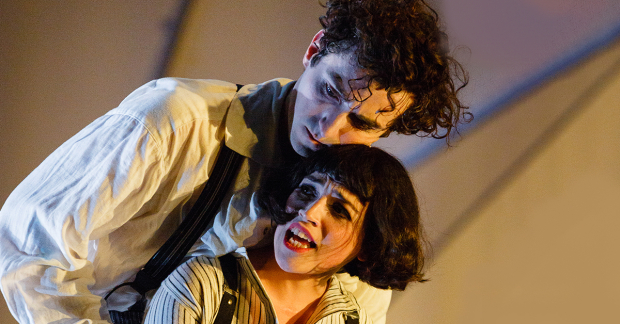Review: The Flying Lovers of Vitebsk (Bristol Old Vic stream)
Wise Children, Kneehigh and Bristol Old VIc collaborate on the streamed experience

© Steve Tanner
"When some things are gone, you thirst for their details in such a heartbreaking way."
Words from Daniel Jamieson's The Flying Lovers of Vitebsk hit all the harder while the bulk of venues remain closed. Bristol Old Vic – initially hoping to welcome socially distanced audiences for the new revival of Kneehigh's piece – was one of the locations forced to keep spectators away due to "tier three" restrictions.
But the show must go on and, first things first – technophobes fear not. Jamieson's play, staged with typical Kneehigh whimsy and enchanting physicality by the company alongside director Emma Rice's new troupe Wise Children, suits the live-stream form remarkably well – more so than Rice's previous virtual piece – Romantics Anonymous.
Whereas Romantics Anonymous, with its bulkier cast and large, choreographed set-pieces, meant the camera had to pull away and distance itself to fit the entire stage, here director of photography Steve Tanner can push in – with the two performers on stage (award-nominees and Bristol Old Vic regulars Marc Antolin and Audrey Brisson) creating a vibrant, intimate experience.
The Flying Lovers of Vitebsk follows Jewish-Belarusi-French artist Marc Chagall and Jewish-Belarusian writer Bella Rosenfeld, who married in 1915 and stayed together through some of the most turbulent, horrifying moments of the 20th Century – the Pogroms, the Holocaust and into the opening salvos of the Second World War.
Jamieson places the emphasis quite firmly on the pair's romance – for good and ill.
Thankfully Brisson and Antolin are utterly hypnotic – characterisation and choreography (Etta Murfitt, working her usual charm) colliding in a blissful 90-minute experience. But the history they live through at times becomes a wash, a lighting designer's gel, or a tonal shift – rather than a seismic alteration in the piece's fabric. It keeps us fixated on Chagall and Rosenfeld but at the same time swerves away from the heart-wrenching realities of subjugation, genocide and discrimination.
This may well be the point – exploring their artists' psyches while also displaying their lack of agency as they hover, at a pen or paint brush's distance from the horrors of the era – at one point Chagall mistakes a policeman hanging from a streetlight for a stray coat.
There are some fun details – the voice of the venue's artistic director Tom Morris on the end of a telephone being one for the theatre nerds. Tanner crossfades shots, pitting ghoulish, semi-opaque frames over one another in real-life. A ghost-like, melancholic piece that loses little of its stage magic when beamed live across the world.












